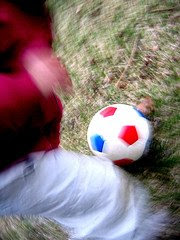 Photo courtesy of Chris Darling at Ctd 2005.
Photo courtesy of Chris Darling at Ctd 2005.
There’s a game of pickup soccer every morning at the elementary school that has a life of its own. And like any life form, the game is hungry, gobbling up children like raw energy, moving from sandy field into the crooked lines of backpacks and lunch bags, through the jungle gym, and then back out onto the field.
On any given morning, a big game gobbles smaller ones, feisty little games develop inside the middle of a bigger one. In the 10 or 15 minutes before the school bell rings and classes begin, the game has split apart maybe a dozen times, breathing in and exhaling children as it rolls across the playground.
As a bystander, it’s hard to figure out the rules, but they do exist. Like cells sharing invisible chains of DNA, the game passes along its knowledge to its players as they brush against one another. This universal code that governs playground pickup soccer, making it organic and alive, is the same code that allows a referee to ignore the 17 Laws of the Game in the “spirit of fair play,” according to National Geographic magazine’s ode to the sport.
In pickup, there are no time-outs, no choosing teams nor defining boundaries, as the game shifts and snaps up new recruits. The game may begin with a clump of children against a single goalie, his back against the wall, blocking not just one, but two, sometimes three balls hurling toward him. But a wayward kick will shift the game into the clusters of girls, giggling and sharing secrets. Reluctantly, they become teammates, standing solidly in a group until the ball comes their direction and then bam! A kick sends the ball bouncing to a different corner of the playground, and the game releases the girls from its grasp.
The girls have been slow to join, but when their noses turned cold and pink, and conversations turned catty, soccer was eyed with greater interest. The first request to play, made by a single girl, was met by silence, then a quick counsel among the boys, and finally a mumbled acquiescence. She joined the game and changed it. With time one girl became two, sometimes three, and by spring, players no longer defined and divided themselves by gender, but had fused into something entirely new.
Leave a Reply